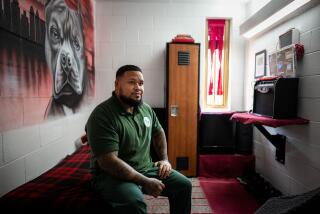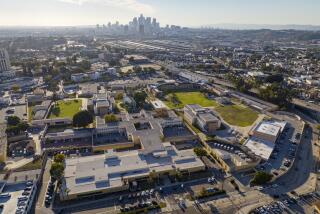Parting Teens From Trouble
- Share via
PENIKESE ISLAND, Mass. — When the sea shines bright and the sun smiles gold, the nine young men sentenced to live on this small patch of land say it feels just like heaven. When the sky rages gray and the wind argues back, they say it is an outpost of hell.
Either way, it is far from the chaos of shattered homes. Far from the temptation of drugs and an economy ruled by theft. Far from easy violence. Far, too, from such basic comforts as electricity.
Twelve miles off Cape Cod, on an island with a one-room schoolhouse and an all-purpose building with sleeping quarters in an unheated loft, life is every bit as challenging as it is isolated. Some kids compare it to Alcatraz. In simple terms, said Mike, 17: “It stinks. When I first came out here, I thought it was the worst place in the world. I didn’t want to be here. I really didn’t want to be here.”
But where was he to go? Like all the boys at the Penikese Island School, Mike knew his way around the Massachusetts juvenile justice system. The last time he got busted--for using and selling drugs, and stealing a car--the judge gave Mike a choice: nine months on Penikese or juvenile jail until he was 21. In the harsh months of winter, Mike said he often rued a choice made by simple math.
Tough and demanding, the private school was founded 28 years ago as a rehabilitative alternative to imprisonment for young male criminals in Massachusetts. Recent reports of death, Draconian practices and minimal success rates at a variety of boot camps and wilderness survival programs have made the small, hands-on approach at Penikese seem all the more exceptional.
“We’re remote and we’re rustic, that’s part of it,” said Toby Lineaweaver, the school’s executive director. “And we take it one boy at a time.”
Substituting Calm, Consistency for Chaos
The school, on a 72-acre land mass that once housed a leper colony, reflects a national attempt to deal privately with the very public issue of at-risk youth. Every year about two dozen 15- to 17-year-olds complete a rigorous mix of manual labor, academics and therapy at Penikese. The regimen is so demanding that 70% of the boys sent to Penikese leave without finishing their sentences. Staff members rotate in for seven-day, 24-hour shifts.
Other than tuition for boys who are referred by judges, the school receives no state or federal aid. Its budget is low, about $1 million a year.
But with a ratio of one staff member for every two students, operating costs are high. Tuition for the average nine-month stay is $60,000 per boy, about $15,000 to $30,000 more than the annual cost of conventional incarceration. The comparatively steep tab subsidizes a staff-intensive environment that seeks to replicate a family, providing the boys with a healthy parent-child relationship they nearly always lacked in the homes they left behind.
“In essence, what we’re trying to do is put the boy in the environment he was denied for 15 years or more,” said Daniel Robb, who wrote about his experiences as a Penikese teacher in a new book, “Crossing the Water.”
“If a kid has grown up in a chaotic environment, you can’t expect to heal him without giving him the basics for every kid: attention, nurturing, love, psychological calm and consistency,” Robb said. “Which is why Penikese is expensive compared to jail.”
At Penikese, there may be no locks on the doors, but there also are no phone privileges, no TV, no video games, no smoking and minimal indoor plumbing. A stiff code of conduct threatens punishment ranging from 100 push-ups for swearing to expulsion for more serious offenses.
Every week, a supply boat brings mounds of wood that the boys chop into logs to fuel the big iron stove that heats their living space and cooks their meals. Each day, half the students spend the morning in the schoolhouse while the other half do chores and vocational activities in a one-room workshop. One boy is always in the kitchen, helping the staff cook. When the wind blew out a window, the boys were told to fix it. In the wood shop, they make furniture. And they repair roofs, a daunting task when the winter wind shrieks by.
The boys tend a vegetable garden, and they look after Ecstasy and Brown Sugar, the school’s pigs. When fish is on the menu, the boys head out with poles. The days are so exhausting that few complain about the 10 p.m. bedtime.
“Most guys leave here and go to jail because they figure it’s easier,” said Mike, who, like all of the boys on the island, asked that his last name not be used.
“Issues with school and family” sent John, 17, to Penikese. “I got in fights a lot. I did drugs. Pretty much everything: coke, sleeping pills, relaxants, marijuana, acid.” John, a muscular blond with bright green eyes, added with some pride, “I never done heroin.”
Along with jail, John was sent to mental hospitals. “I got kicked out of every program.” Once he got busted for “hooking up” with a female resident. Another time he smashed a stereo. Then there was a fight with a broken mirror.
“This was the last place that would take me,” John said. “I was like, what the hell.”
With his nine-month term near completion, John sounds like a Penikese Island brochure. “The staff here, the staff is like family. They’re wicked cool. They remember what it was like when they were young. Some of them have histories like we did. They’re not just college graduates who read about it somewhere. The staff here, you can talk to them a lot easier than you can talk to a shrink, some doctor who went to Harvard for eight years.”
Associate Director David Masch, for example, is known to everyone at Penikese as “Pops.” Pops is 63, with a furry gray beard and the longest tenure of any Penikese staffer. In nearly 30 years he has watched the program mature from a primitive wilderness experience to an accredited school. He also has seen an ongoing emphasis on the value of hard work.
“One of the basic parts of our philosophy has been that kids in the modern world seldom see any good come from the work they do,” Masch said. “Out here they can see results. They learn that your work benefits not only yourself but the people around you. They learn that if you don’t cut the wood, you don’t heat the house. That part of our fundamental philosophy hasn’t changed, which is personal responsibility.”
To ensure that at least some of that philosophy stays with students when they leave the island, Penikese employs a after-care director whose duties include agency and school liaison, job-seeking support and family visits.
High Intensity Yields High Success Rate
Venturing into the world of data collection, the school has kept track of graduates for the last five years and found that fewer than one-quarter are in jail. Lineaweaver said that figure “is double the success rate of currently popular interventions such as boot camps or straight incarceration.”
The staff also maintains less formal contact with many graduates. Masch said he often hears from one boy in particular. “He was a car thief, among other things. I remember arguing with him, arguing all the time. Now he’s working for an Internet company in Kentucky. He’s doing great.”
Penikese Island School is unusual but not unique. Like Penikese, many alternative programs claim strong track records. But as criminology professor James Alan Fox of Northeastern University in Boston pointed out, certain controls are built into the success statistics of any such program. “You can’t fail at prison. They can’t throw you out. So, in a sense, they’ve already taken away the poor risks at a place like Penikese Island.”
Still, Fox said, “I will tell you that over the years, therapeutic programs, particularly small ones, have worked better than lockups. These high-supervision, high-intensive programs over the years have been tested, and generally they work very well.”
Fundamental to the formula here is the simple consistency of life on an island. “The days unroll predictably, and this really calms these guys down,” said Robb, who now teaches on Cape Cod.
Lineaweaver acknowledged that the school’s small population means that only a handful of boys can be helped there each year. But, he countered, “we think that anything that can be done to improve the functioning of these kids so they live their lives less violently is significant.”
Besides, he continued, “when people say to me, how can a little program like Penikese make a difference? I say, excuse me, let’s take a look at the big picture. You tell me what about our current approaches are working at all. We have a threefold increase in the spending on prisons in the last 10 years and a recidivism rate in adult prisons of about 60%. In Massachusetts alone, the total budget for at-risk youth is more than $600 million per year.
“If in every state, there were several programs of the Penikese kind, you probably would have a tremendous impact.”
Mike, wearing a bandanna with dragons on it, said the island has had a big effect on his life. He said he listens better now, and “I’ve learned to keep my mouth shut sometimes.” He’ll be leaving soon and may go to work as a scalloper, like his father. Mike said he’s determined not to go back to selling drugs, “because I don’t want to go back to where I’ve been.”
Maybe he won’t be perfect when he gets back, “but I’m going to at least make an effort. Before, I didn’t even do that.”
More to Read
Sign up for Essential California
The most important California stories and recommendations in your inbox every morning.
You may occasionally receive promotional content from the Los Angeles Times.












